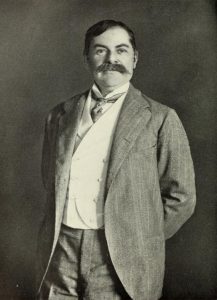Remembering Thomas Nelson Page
(April 23, 1853 — November 1, 1922)
Spencer J. Quinn
2,365 words
After the Civil War, the American South was in ruins. Beyond the poverty, oppression, and the rapid demise of the old regime, however, the inheritors of the former Confederacy found themselves without defense in the national court of moral opinion. They were a defeated people who had drawn arms against a tolerant and progressive government in order to cling to outmoded ways of life, including (most offensively to some) the ancient practice of slavery.
Those who pined for the South’s days of greatness needed a champion. During the postbellum period, Thomas Nelson Page was one such champion. As a bestselling author, poet, essayist, and, later, a diplomat, Page’s fame and popularity became so widespread that many of his contemporaries believed he played a singular role in resuscitating the image of the South in the American mind.
Page loved the South — never to the point of hating the Union, of course — but enough to become its most eloquent advocate. For his entire career, he defended its traditions, its culture, and, most importantly for the Dissident Right today, its race-realism. Decades before Madison Grant and Lothrop Stoddard were penning scientific treatises on race and eugenics, Thomas Nelson Page was writing essays clearly delineating and defending the hierarchical Southern attitudes on race.
Born in Hanover County, Virginia on April 23rd, 1853, Page grew up on a small plantation on which his father owned some sixty slaves. His unrelenting conservatism he inherited from his parents, who instilled a strict religious faith in the boy. According to his critic and biographer Theodore Gross, Page’s mother “insisted on prayer three times a day — but also a deep suspicion that political or social change meant an inevitable decline in moral values.” Page was a tolerable, if uninterested, student, but swallowed up Tennyson’s poetry and Sir Walter Scott’s Waverley novels at an early age. In hindsight, this makes a lot of sense given the high romance of his best-selling fiction. As with many Southerners at the time, the Civil War impoverished his family. As a young adult, he had to scrape by until he could secure a degree in law. From 1874 to 1893, law was Page’s primary profession, although he began serious writing during this time; his early stories and essays were almost always well-received. During this time, he married Anne Seldon Bruce, who was clearly the Southern belle archetype upon which many of Page’s heroines were based. The poor thing died of a throat hemorrhage a year and a half after her wedding day. She was twenty years old.
Page’s first great success was with his short story Marse Chan: A Tale of Old Virginia, published in 1884. With this, along with similar stories such as Unc’ Edinburg’s Drowndin’, Meh Lady, and Ole ‘Stracted, Page became part of a “local color” movement then happening in the South — in his case, many of his stories were told entirely in Negro dialect. In 1887, his best stories, including the above four, were published in one volume entitled In Ole Virginia. At the time, people were hungry for antebellum reminiscences, and Page was happy to oblige.
Honor, loyalty, courtesy, chivalry, heroism, and sacrifice are themes which flow like blood through these early stories. In nearly all cases, his white characters are perfectly idealized. They are exactly what Southern ladies and gentlemen are supposed to be as they thrive in their Edenic plantations and live up to the strict cultural code of their ancestors. And the Negroes, who share the race-realism of their masters and happily accept their servile condition, watch along with pride. It is clear that these white characters, like their author, take the time-honored Southern traditions in deadly earnest. Yet, by presenting this through a Negro lens, Page effects a degree of separation between himself and his principals. What we get is not so much Page’s idealized vision of the South, but the slave’s, with all of his voluble idiosyncrasies and idiomatic language intact.
Page’s greatest foray into fiction occurred in 1898 when he published Red Rock: A Chronicle of Reconstruction. It is perhaps the most successful and expansive fictional account of Reconstruction ever written. It was the number five selling book that year and made Page a literary star. Many of Page’s go-to themes present themselves in Red Rock, of course, but the author had broadened his canvas considerably. Along with his honorable slaves, he deals with good-for-nothing slaves, and evil slaves, and slaves who don’t want to be slaves. We meet scalawags and carpetbaggers and well-meaning Yankees and not-so-well-meaning Klansmen and others who buck thematic trends in the Pagean world. Despite the evocative language, colorful characters, and a tight, suspenseful plot, Red Rock remains slightly wanting as highbrow literature, given Page’s fealty to his archetypal Southern characters and his refusal to take his thumb off the scale of moral conflict in the story. However, as a political novel, Red Rock is second to none. You know how in classic science fiction readers will forgive predictable plot twists and stereotypical characters as long as the technological and scientific ideas stand out? It’s like that with political ideas in Red Rock, except that Page’s political conflicts do not become outmoded; they are still raging today wherever you have white people dealing with non-whites and their enablers who wish to crowd them out of their own lands.
As Page grew accustomed to success, he eventually remarried and moved away from the South, spending time in Washington DC and Maine. His political interests shifted to the national level, with his vocal support for Theodore Roosevelt in 1904 and his initial opposition to Woodrow Wilson in 1912. Page was a well-known celebrity, and his opinion on political affairs certainly mattered. From 1913 to 1919 he served as the US ambassador to Italy, gaining the love and respect of the Italians during World War I. As one would expect, Page published a memoir about it, entitled Italy and the World War, in 1920.
In any event, Page had left home for good. His later novels seemed to reflect this as he explored themes beyond the crumbling plantations of his earlier fiction. Ironically, by addressing the complaint that he too often recycled his own material, he revealed his limitations as a fiction writer. With Page’s later novels Gordon Keith (1903) and John Marvel, Assistant (1909), Gross refers to him as a “local colorist who has forsaken local color.” Perhaps in writing about the “vanity of wealth” in stories set in Northern cities churning with poverty and political change, Page expanded his canvas a bit too far. The Southern identity, of course, never left, but according to contemporaneous accounts, Page was trying a little too hard to keep up with the times, relying more on other writers (Theodore Dreiser, for example) rather than his own experience for many of his ideas. As a result, during the first decade of the twentieth century, Page’s work became more derivative, and his influence and popularity began to wane.

You can buy Spencer J. Quinn’s young adult novel The No College Club here.
One idea that always seemed to stick with Page, however, was the aristocratic notion of blood. For him, true aristocrats are born, not made. Wealth is not the only measure of a man, since wealth can be acquired through cunning or dishonest means. Gentlemanly qualities, however, such as chivalry, loyalty, hospitality, bravery, and the other elements of the Southern code, are what great civilizations are built upon. Such qualities are concomitant with the stock of men who compose these civilizations. When lacking enough such men, civilizations fall. . . with all their riches fluttering down along with them.
Page makes this point quite often in a remarkable short story entitled Bred in the Bone, which was published in 1901. In it, we see a return to the Negro dialect found in Marse Chan. Here we have an old Negro horse trainer who spars entertainingly in verbal combat with the black children who hang around the horse stables. This is “Colonel Theodoric Johnston’s Robin,” a man who reveres his former owner and, like Page himself, constantly waxes poetic about his antebellum youth. Robin greets Johnston’s grandson who plans to race a horse from back home in an upcoming race. The horse seems haggard, but after close inspection, Robin realizes the animal has the genetics to be a champion. The narrative, however, continues with much of the same formula one would expect from a Page story (in this case, a chivalrous gentleman rider impressing a young lady as if in a Sir Walter Scott novel), but hinges upon a truly inspired plot twist which takes the story to its unexpected and exhilarating finish. In the end, Colonel Theodoric Johnston’s grandson represents his family and his Southern heritage admirably and wins the admiration of the beautiful young girl. This kind of regional home cookin’ may seem fatuous or vain in the hands of any other author, but with Page, whom we know means every word of it, it comes off as nothing less than inspiring. Thomas Nelson Page may have fallen out of literary favor fairly quickly after his death, but he was popular for a reason, and this was it. Only he could take a story that was pure corn pone and spin it into gold.
More relevant to today’s political strife however are Page’s essays dealing with race. Indeed, on the strength of two collections, The Negro: The Southerner’s Problem (1904) and The Old Dominion: Her Making and Her Manners (1908) as well as his delightful 1897 memoir “Social Life in Old Virginia Before the War,” Thomas Nelson Page belongs alongside Madison Grant and Lothrop Stoddard as one of the twentieth century’s great spokesmen for the white race.
In “Social Life,” Page recounts the glories of his plantation youth. He admits outright that he was motivated by “sheer affection” for the Old South as well as a desire to correct the record on Southerners who were being depicted in postbellum America with the odious stereotypes still in use today. “Social Life” is rife with chivalrous and honorable gentlemen who believed in God, their wives, and their blood, most likely in that order. The plantation’s mistress was universally “exquisite, fine, beautiful; a creature of peach-blossom and snow. . .” As Page tells us, “[s]he was not versed in the ways of the world, but she had no need to be; she was better than that; she was well-bred.”
And, of course, the Negroes were uniformly happy with their inferior status and utterly devoted to their white masters. And why wouldn’t they be? Southern whites, according to Page,
Christianized the negro race in a little over two centuries, impressed upon it regard for order, and gave it the only civilization it has ever possessed since the dawn of history.
Politically incorrect notions, to be sure, even in Page’s day. But, as with most of his essays, factually undeniable. He ends his essay powerfully by asserting the racial identity and dominance of whites and crediting the Old South as the chief standard-bearer of this noble cause. He states unequivocally that Southern whites
maintained the supremacy of the Caucasian race, upon which all civilization seems now to depend. It produced a people whose heroic fight against the forces of the world has enriched the annals of the human race — a people whose fortitude in defeat has been even more splendid than their valor in war. It made men noble, gentle, and brave, and women tender and pure and true.
Page expounds upon many of these ideas in his voluminous The Old Dominion: The Making and Her Manners. Much of it deals with the history of the white race in the New World, explaining exactly how whites, through their genius, bravery, and heroism rebuilt Western Civilization in a savage land.
Of course, race never falls far from the author’s consciousness during these essays. Throughout his life, Page never abandoned his race-realism and never wavered from his understanding of how important honest race relations are to a healthy society. Close to the end of The Old Dominion, Page recounts the horrors of Reconstruction, with all its corruption and debauchery. Compared to the revisionist and nigh-socialist interpretations of this period by historians Kenneth Stampp and Eric Foner, Page’s one-chapter account feels like a breath of fresh air. Unlike these scholars, Page understands the Negro. He’s not afraid to admit and itemize the Negro’s manifest inferiority to whites while extolling their not-insignificant virtues when operating within the milieu of Pax Caucasica. As such, Page explains the folly of Reconstruction and how it attempted to, in Gross’ terms, “legislate [the Negro] into a state of equality.” For, as Page explains, “the races themselves are inherently unequal.”
This becomes explicit in The Negro: The Southerner’s Problem, which, along with Red Rock and the Marse Chan stories, has proven to be one of Page’s most enduring works. He portrays slavery as he did in “Social Life in Old Virginia Before the War” and makes the point that without the paternalistic control of whites, the Negro quickly reverts to his more savage (and natural) state. This resulted in a number of cases in which members of the Negro militia ravished white women.
Indeed, “ravishings” is a recurring theme in the book, and Page convincingly explains that this and other examples of black misbehavior and malfeasance prompted the Jim Crow backlash of the late nineteenth century. To support his conclusions and defend his region’s treatment of the Negro, Page presents as much evidence and as many statistics as was available back then. In all, it is a devastating indictment of the cultural egalitarianism which was threatening to cloud our understanding of race back in Page’s day and which keeps a heavy pall over it today.
We can only hope that by re-introducing Thomas Nelson Page to the public and offering an idea of what he was like as a man, as an author, and as a public figure, whites in the twenty-first century will remember what their twentieth-century counterparts ultimately forgot: that we should never forget Thomas Nelson Page.

Remembering%20Thomas%20Nelson%20Page%0A%28April%2023%2C%201853%20and%238212%3B%20November%201%2C%201922%29%0A
Share
Enjoyed this article?
Be the first to leave a tip in the jar!
* * *
Counter-Currents has extended special privileges to those who donate at least $10/month or $120/year.
- Donors will have immediate access to all Counter-Currents posts. Everyone else will find that one post a day, five posts a week will be behind a “paywall” and will be available to the general public after 30 days. Naturally, we do not grant permission to other websites to repost paywall content before 30 days have passed.
- Paywall member comments will appear immediately instead of waiting in a moderation queue. (People who abuse this privilege will lose it.)
- Paywall members have the option of editing their comments.
- Paywall members get an Badge badge on their comments.
- Paywall members can “like” comments.
- Paywall members can “commission” a yearly article from Counter-Currents. Just send a question that you’d like to have discussed to [email protected]. (Obviously, the topics must be suitable to Counter-Currents and its broader project, as well as the interests and expertise of our writers.)
To get full access to all content behind the paywall, please visit our redesigned Paywall page.
3 comments
Much appreciated this. Page is otherwise a closed book to me, but that will change.
i stopped reading at: “They were a defeated people who had drawn arms against a tolerant and progressive government…”
is that a tongue in cheek swipe or have you actually lost your mind? have you never read any actual history? tyrant lincoln, in his inaugural, threatened tariff collection (which had risen exponentially since the 1830’s, and was illegally being solely spent on northern infrastructure) at point of arms and invasion…. tolerant my ass. lincoln didn’t give one flying F about slavery, and if you actually knew any history, you’d of never opened your opine w/this statement. doubt you’ll print this, but you and i both now know, you don’t your history.
Hi Kikz,
I agree with what you’re saying about Lincoln being tyrannical rather than tolerant (and we would probably also agree that he was progressive for his time). But I think you’re taking what I wrote out of context. In the previous sentence I introduced the ‘national court of public opinion’ where the postbellum South had no defense. By placing the statement you objected to directly after this sentence, I was implying that ‘tolerant and progressive’ was how the anti-Southern national court of public opinion at the time saw Lincoln and the Union (and itself), not how they really were. I thought I had made that clear with the dismissive phrase ‘cling to outmoded ways’ and stating how slavery was offensive to some–meaning some people *not* from the South. I was effectively summing up the jaundiced and unjust hostility that many in the North had for the South after the war, and setting up the *reason* why the South needed a champion like Page.
I hope you will give my article another chance. Thanks.
If you have Paywall access,
simply login first to see your comment auto-approved.
Note on comments privacy & moderation
Your email is never published nor shared.
Comments are moderated. If you don't see your comment, please be patient. If approved, it will appear here soon. Do not post your comment a second time.